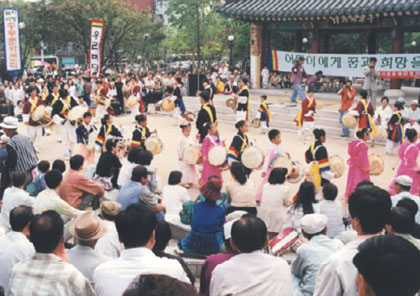
Kim Ki-jong is a member of "Woori-madang," a social activist group seeking to revive the lost traditions of the common people of Korea. Only six pyong (19.8 square meters), the organization"s office is located on the second floor of a shabby white brick building. Its small size and neglected appearance offer no clue to the extent of the organization"s past activities, all recorded in massive stacks of files.
Woori-madang dates back to 1984 when its office was erected in Shinchon in the midst of the oppressive period of the military regime in Korea. ?"Woori" is the Korean word for "our," standing for common ownership without exclusionism. "Madang" means an open ground. Together "Woori-madang" is "our open ground" where everybody is welcome.
"Before the size of our organization shrunk down to six pyongs, our activities were vast and many had joined," recalls Kim. Over the past nineteen years Woori-madang has been involved in various activities. With the establishment of the Unification Culture Research Institute the members held seminars discussing the task to find common ground in the culture of the two sides of the peninsula. They have endeavored to propagate the official Arirang song that the North and the South have consented on in 1991.
Reproduction of the traditional plays like the "Bonsan-dae" and the "Manseok-jung" was also one of its valuable contributions to the preservation of Korea"s past culture.
Mr. Kim explains the significance Manseok-jung play has. "The play uses the contrast of light and shadow. Historians say that the shadow play"s? roots can be found in Asia, and this play in Korea is an evidence of such. That"s why it must be transmitted to future generations."
However, they have not been able to hold a performance for some time because of lack of participants.
"Stepping on the god of the earth is another of the disappearing traditions. It is said that the act of stepping on the ground on the first full moon day satisfies the god of the earth, and the god in return brings happiness and health."
The "Samul-nori-pae" with the traditional instruments of drums, changkus and gongs, carries on a parade around the houses and stores of which they are regulars. They ask for the blessings of the place and the owners reward them with some food or money. Unfortunately with each passing year the crowd is getting smaller and smaller.
"Everyday we are struggling to keep the office open. Financially, and in terms of members, we are on the verge of facing a standstill in our
activities," says Kim.
For more than twenty years, Woori-madang has endeavored to resurrect the long forgotten folk-customs of the Korean people. Traditional music, plays and clothing are what they sought and still seek to preserve. Furthermore, their efforts for a cultural interchange between the North and the South must not go unnoticed.
The place that people call Shinchon today lost its original name not too long ago during the Japanese colonization of Korea. Before it was called ?"Sae-mal" or "Sae-teo" in the pure Korean Language, meaning "new village." When Japan ruled over Korea, the name was changed into Chinese characters and has remained ever since. Woori-madang calls its activities in Shinchon as "Discovering Sae-tae." Finding the folk customs that perished during the period of colonization or simply abandoned by moderners is its self-given mission.
But, of all its hardships, what most disheartens Woori-madang is people"s indifference towards its efforts. "What hurts me the most is when I hear people who had once been part of our organization say that Woori-madang is already non-existent, that it hasn"t survived the harsh realities of the world. They even say this with me here, firm on my feet, determined to keep it alive no matter what," says Kim.
Which of these points of view is more accurate isn"t clear, but if Woori-madang loses the means to stay open, Korea will lose a powerful means to keep its traditions alive.
neyessioui@ewha.ac.kr
Ewha Voice
evoice@ewha.ac.kr

